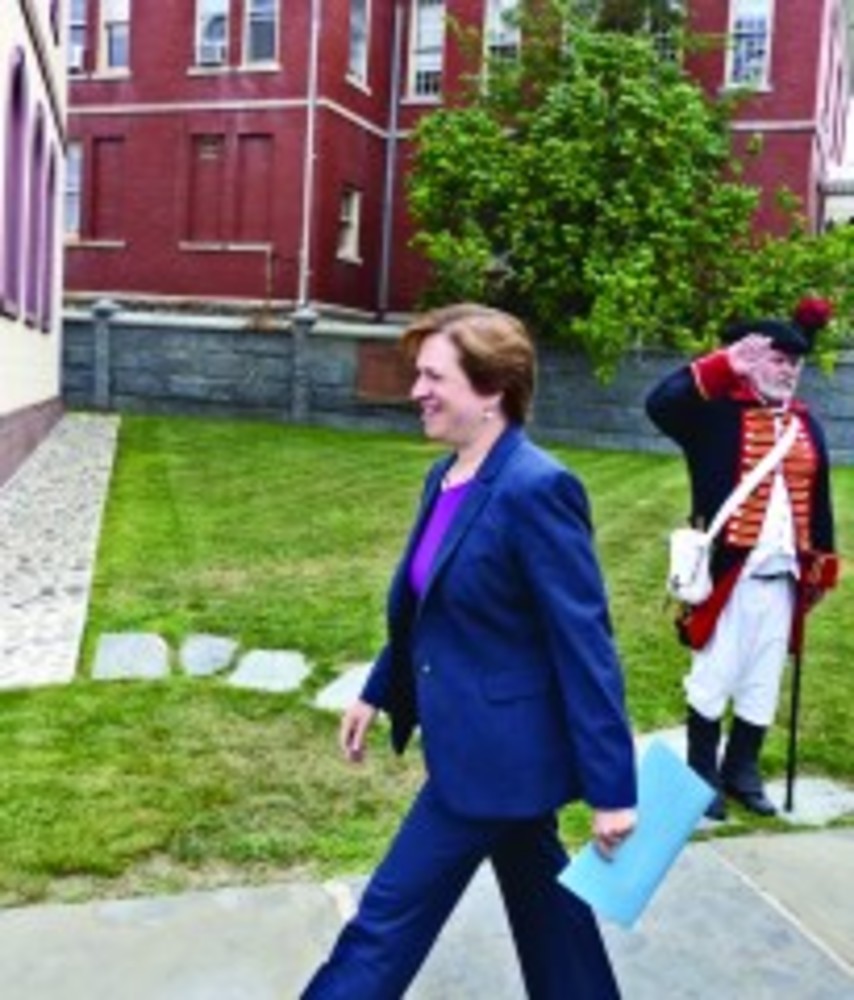Kagan’s speech recognized as ‘among the finest given at Touro’
 NEWPORT – More than 400 people crowded into two venues in Newport – Touro Synagogue and the Newport Community Church next door – to hear Elena Kagan, associate justice of the U.S. Supreme Court, deliver the keynote address to celebrate the 250th anniversary of Touro Synagogue. Kagan, whose speech many attendees declared “among the finest given at Touro Synagogue,” spoke at Touro as part of the 66th annual reading of the George Washington letter – one assuring congregants of the Hebrew Congregation of Newport promising them, among other commitments, “to bigotry no sanction.”
NEWPORT – More than 400 people crowded into two venues in Newport – Touro Synagogue and the Newport Community Church next door – to hear Elena Kagan, associate justice of the U.S. Supreme Court, deliver the keynote address to celebrate the 250th anniversary of Touro Synagogue. Kagan, whose speech many attendees declared “among the finest given at Touro Synagogue,” spoke at Touro as part of the 66th annual reading of the George Washington letter – one assuring congregants of the Hebrew Congregation of Newport promising them, among other commitments, “to bigotry no sanction.”
Kagan, who is the Supreme Court’s 112th justice, fourth female justice, and one of three Jews currently serving on the bench, entered the synagogue about 15 minutes before the start of the letter-reading ceremony. Even at that early arrival time, most of the colonial-style chairs that fill the synagogue’s sanctuary were already occupied by synagogue officers and members, invited guests and a wide array of Rhode Island dignitaries, including, among others, Rhode Island Governor Lincoln Chafee, U.S. Senators Jack Reed and Sheldon Whitehouse, Rhode Island State Senate President Teresa Paiva-Weed and Newport Mayor Henry F. Winthrop, as well as synagogue co-president Bea Ross.
Kagan and these dignitaries came on Sunday, Aug. 18, to participate in the afternoon’s celebratory program and to declare publicly the crucial importance of the words in Washington’s letter. Those words – that the new government of the United States of America would give, “to bigotry no sanction, to persecution no assistance” – are read every year at Touro Synagogue. Every speaker made reference to these words; for her part, Kagan addressed the meaning of these words from a personal perspective and a legal and historical standpoint. Their speeches and the reading of the letters exchanged between Touro Synagogue’s Moses Seixas and Washington capped a weekend of celebratory activities. (See accompanying article by Sam and Linda Shamoon, “Two hundred fifty years and counting …”)
Kagan took the speaker’s podium immediately after the reading of the letters – one from Seixas, of the Hebrew Congregation of Newport, and Washington’s response to him. She began by invoking the details, history and desires of the families who had founded Touro Synagogue – especially of their finding in Newport a place where they could live as Jews, publicly and safely, while pursuing their livelihoods and caring for their families.
Within this context, Kagan then shared details from her personal history. Her grandparents were Jewish immigrants from the ever-changing Polish-Russian border region who had found in America a place where they could live as Jews and Americans with no conflict.
Her mother, she said, spoke only Yiddish until she started public school; eventually, Kagan’s mother became a public school teacher, her father a lawyer. And now, reflected Kagan, their daughter is a Supreme Court associate justice.
Kagan quoted her mother’s words: “Only in America.”
Kagan continued, with a focus on a particular kind of Jewish success in America. Jews have found in this country, she explained, a home where they could have “all the benefits” of being Americans and of being Jewish. On a recent trip to Israel, her sense of her American Jewish identity had been aroused and challenged when an Israeli asked her how she felt about living in the Diaspora. Kagan reported that she was taken aback by the question because she never separated her identities as an American and a Jew. In much of the world (other than Israel), she said, Jews are conflicted between their identities as Jews and their loyalty to their country of residence.
In turning to specific words and phrases in the letters written by Seixas and Washington and parsing them as a legal scholar, she agreed with other speakers who noted that Washington’s letter merely repeated Seixas’ words about tolerance and bigotry.
But Kagan added, “Then Washington did something astonishing.” He wrote, she said, that the mere absence of persecution and the indulgence of one class of people over another are not enough. The radical step that Washington took, explained Kagan, was to declare that every person has “inherent rights” to enjoy the “immunities of citizenship,” and “everyone shall sit in safety under his own vine and fig tree.” These were truly radical concepts in the late-18th century, explained Kagan, and Washington’s words, she said, are a “founding lesson” in what it means to be an American. The “equality guaranteed by citizenship,” said Kagan, ultimately inspired a single national community from among the people in spite of their differences.
After she finished her address, the audience rose as one with thunderous applause. The synagogue emptied slowly, as many people waited near the portico to speak to Kagan or take pictures with her. It was an ideal conclusion to a truly historic day in the life of Touro Synagogue.
Touro Synagogue: 85 Touro St., Newport, Tourosynagogue.org, 847-4794.
Sam Shamoon (sam.shamoon@gmail.com), of Providence, is a Touro Synagogue Foundation board member. Linda Shamoon (lkshamoon@gmail.com) resides in Providence.







